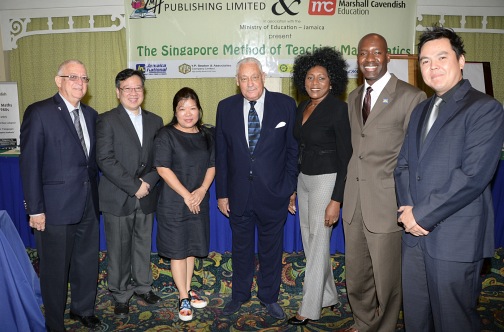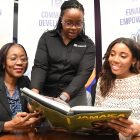Rhodes Scholars Focus on Rural Jamaican High Schools
KINGSTON, Jamaica – More than 90 students from four rural under-performing high schools in Jamaica are now immersed in two intensive Rhodes Scholar-supported “boot camps,” geared to improve their competence in maths and English.
The five-week camps, which started on July 13 and take place simultaneously in the parishes of Manchester and St Mary, are part of the TEACH Caribbean programme, a not-for-profit Jamaica-based organisation, established by a group of Jamaican Rhodes Scholars. The programme is being supported by the Jamaica National Building Society (JNBS), and endorsed by the Jamaican Ministry of Education. And, the main participants will be students from the May Day and Mile Gully High Schools in Manchester; and Brimmer Vale and Islington High Schools, in St Mary.
“Maths and English are foundation competencies which students need to move forward; however, many children continue to face serious challenges with the subjects. And, our students, particularly in our rural institutions, do not always get the same attention as those in urban schools with similar challenges,” stressed Mariame McIntosh Robinson, Conceptualiser of the TEACH Caribbean programme, who was also a Rhodes Scholar.
Fewer than 40 per cent of students who sit English Language at the Caribbean Secondary Education Certificate (CSEC) level pass the subject, while almost half fail maths, data from the Economic and Social Survey by the Planning Institute of Jamaica shows. And, the performance in the subject areas among non-traditional schools is much lower.
TEACH Caribbean, which ran a three-year pilot with seed funding from the Rhodes Trust, has already observed marked improvements in the performance of students at May Day and Mile Gully High Schools in Manchester, where the initiative started.
The current Manchester cohort, which started with TEACH Caribbean in summer 2013, improved their average scores from 54 per cent to 79 per cent in maths and from 44 per cent to 69 per cent in English in 2013. In 2014, maths scores increased from 30 per cent to 51 per cent; and from 50 per cent to 65 per cent in English.
Students from the May Day and Mile Gully high schools in Manchester, Jamaica, participate in class during the 2013 TEACH Caribbean summer camp. The successful programme, supported by Rhodes Scholars, assists students from rural high schools to improve their competency in maths and English over a course of four summers.
Students from the May Day and Mile Gully high schools in Manchester, Jamaica, participate in class during the 2013 TEACH Caribbean summer camp. The successful programme, supported by Rhodes Scholars, assists students from rural high schools to improve their competency in maths and English over a course of four summers.
“The ultimate metric will be the percentage of our students who achieve a pass ranging from grades one to three in maths and English when they sit the CSEC exams in 2017. Our goal is that the majority of our students must pass CSEC maths and English,” Mrs McIntosh Robinson emphasised.
At the summer camp, students will be taught by a team of local Jamaican teachers and Rhodes Scholars of various nationalities who are currently enrolled at Oxford University in England. This year two Rhodes Scholars will join the teaching team: an Australian who taught for several years in the Teach for Australia programme; and another scholar from India, who will teach mathematics.
The students will attend the programme for four consecutive summers starting the summer after grade seven, until the summer prior their CSEC exam year in grade 11.
Boys from the May Day and Mile Gully high schools in Manchester, Jamaica, construct a ladder using their maths skills. The students were participating in the 2013 TEACH Caribbean summer camp. The successful programme, supported by Rhodes Scholars, assists students from rural high schools to improve their competency in maths and English over a course of four summers.
Boys from the May Day and Mile Gully high schools in Manchester, Jamaica, construct a ladder using their maths skills. The students were participating in the 2013 TEACH Caribbean summer camp. The successful programme, supported by Rhodes Scholars, assists students from rural high schools to improve their competency in maths and English over a course of four summers.
“The success of the programme so far has prompted us to expand it to other schools; and, therefore, this year we are adding a new group of students from St. Mary to the TEACH family who have just completed grade nine at the Brimmer Vale and Islington High Schools,” Mrs McIntosh Robinson explained.
The schools are two institutions currently receiving assistance under the JNBS Foundation’s iLead programme, a project being implemented in collaboration with the Ministry of Education to strengthen administrative and instructional leadership; as well as, governance at schools in Portland, St Mary and St Thomas.
“Leadership is a critical problem in many of our schools; and, while we work at improving the capacity of leadership, we also need to engage our children and help to influence their competency in foundation areas that will help to propel them forward,” said Director of Education Programmes at JN Foundation, Dr Renee Rattray. “Therefore, we welcome the TEACH Caribbean intervention in these schools.”
Mrs McIntosh Robinson noted that a critical part of the programme is also aimed at developing awareness of the Rhodes Scholarship and a pool of potential Rhodes Scholars.
“An important part of the TEACH Caribbean programme is about raising the confidence level and expectations of the students, and teachers, so that they can be empowered to believe that they can achieve their full potential,” she said. “A Rhodes Scholar is not necessarily a student who went to a traditional high school.”











